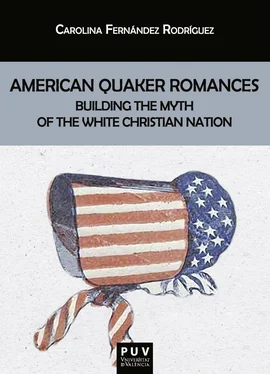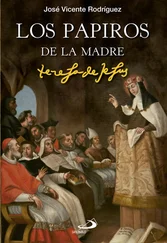Admittedly, Ann Turnbull’s romance shares some characteristics of inspirational romances. Quakerism, for example, plays an essential part in it, as does the beginning of the colony of Pennsylvania, conceived as a haven for British Quakers, and even the contribution of the Quakers from Germantown, Pennsylvania to the abolitionist movement; the novel also refrains from including premarital sex, though one might argue that rather than showing a concern with “clean” or sex-free romance, the author may be simply bearing in mind that hers is a book for young adults. Carla Kelly’s romance, for its part, features a Quaker protagonist. Her faith is, more often than not, irrelevant, merely a detail in her characterization that is intended to add some distinctiveness or exoticism to the character, but that happens to be the case in some Evangelical romances that feature Quaker heroines too. For their part, Joanne Sundell’s novels clearly depart from the Christian fiction requirement that romances show no explicit sexual scene (which, incidentally, is also the case in Loving Charity, Tucker’s Claim, Spindrift and The Turncoat ). Indeed, Sundell’s novels go as far as presenting a hero and a heroine who have pre-marital sex, and a hero who divorces his first wife. Still, the weight of Quakerism in the characterization of the hero is such that I have decided to keep them both as part of the corpus. More strikingly, Eileen Charbonneau’s The Randolph Legacy , despite being a secular romance, partakes of a characteristic that is considered quintessential of the Christian romance: that of featuring a love triangle formed by the hero, the heroine and God, whose preeminence over the hero is unquestionable. In Charbonneau’s romance, indeed, Ethan Randolph, the novel’s atheist hero, doubts that he will ever gain the love of the heroine, the Quakeress Judith Mercer, because he is clearly at a disadvantage within the triangle: “Did he dare think a woman who spoke with God might love him forever?” (1997: 345). This, I argue, is definite proof that the distinction between Christian and secular romances with Quaker protagonists is not always obvious, which is the reason why I have decided to include both categories in my analysis.
Quaker Romances and National Identity
Considered as a whole, these thirty-nine romances offer a very interesting opportunity to test Laura Vivanco’s hypothesis that popular fiction is “a form of collective national therapy” (2016: 124). With this book, in particular, I intend to pinpoint the reasons why many U.S. romance readers feel attracted to these stories, and to unveil the specific goals that they might be trying to achieve as they immerse themselves in these historical romances; ultimately, my aim is to explore readers’ therapeutic use of Quaker romances, following Vivanco’s metaphor. In so doing, I will give special consideration to Hsu-Ming Teo’s conclusion that “focused enquiry into individual [romance] subgenres, authors, and texts yields important knowledge and understanding of women’s popular culture, as well as shedding light on a variety of other cultural phenomena such as national identity , […] [and] whiteness […], among many other themes and topics” (Teo 2018: 20; emphasis added).
With that in mind, this book will analyze how historical romances with Quaker protagonists contribute to a particular version of U.S. history and national identity, one which many readers find very appealing and, to some extent, therapeutic. The therapeutic power would come from the fact that the romances under analysis place special importance on several issues—four, in particular, as will be seen—that have a determining impact on the formation of a people’s national identity. As Ina Bergmann has explained, inherent to historical fiction is “the urge to create a national consciousness and a cultural identity” (2021: 15); for that urge to be satisfied, authors need to combine history with “[a] categorical triad of race, gender, and religion,” the three of which are “the foundational pillars” of historical novels (2021: 12). The need to forge a national consciousness and a cultural identity seems to have become even more acute in the twenty-first century, “[e]specially since the millennial hysteria gained momentum and the traumatic events of 9/11 unsettled […] the United States” (Bergmann 2021: 194). So, considering those circumstances, this book will analyze how Quaker romances—a majority of which, as said, have been published in the twenty-first century—deploy four elements, i.e., history, gender, religion, and race, and how these four elements contribute to the formation of a particular national identity.
Chapter one will specifically deal with how historical narratives can be used as a mirror for the present and a way of articulating contemporary anxieties and concerns, not only on a personal level, but also on a national one. It will also offer an overview of the main historical periods that the romances under analysis have chosen as their background, as well as the settings most often favored by their authors. All in all, it will show how these historical romances commodify history to sell a biased narrative of the nation’s origins. Chapter two will focus on the question of gender roles and the complicated balance the novels maintain between conservative and progressive ideas. Chapter three will concentrate on another commodification process, though this time of a religion, i.e., Quakerism, whose minority status and outer signifiers (mainly, plain speech and plain dress) favor processes of appropriation and exoticization. This section will explain the said processes, as well as the causes that draw writers and readers alike to Christian and secular romances with Quaker protagonists. Chapter four will deal with the issue of race relations, emphasizing the problematic representations of characters of minoritized races that prevail in the romances under analysis.
Finally, chapter five offers a case study of the only romances that take place in the twentieth century, namely, Suzanne Simmons Guntrum’s The Golden Raintree , which is set against the backdrop of the Great War, and Anna Schmidt’s The Peacemakers trilogy, which takes place during the Second World War. As in the romances that feature previous periods, in these novels, too, history, religion, gender roles and race relations play a vital role. However, they present Quaker heroines who are quite distinct from nineteenth-century Quakers in that they use neither plain dress nor plain speech and practically the only thing that sets them apart from other Christians is their out-and-out pacifism or, as Friends would put it, their Peace Testimony, especially remarkable during the two world wars. Most conspicuously, these twentieth-century romances, especially Anna Schmidt’s, offer a change in the minoritized Other, who is no longer an African American or a Native American, but is now a Jew. For these reasons, that is, the alterations they offer in the outer portrayal of Quakers, their shift in the ethnicity of the characters in the victim role, and their closeness in time to the present, they can be considered as an interesting corpus which deserves a separate and more in-depth study.
All in all, the analysis of these thirty-nine romances with Quaker protagonists will underscore the relevance of the four elements above given as being responsible for the novels’ success; namely, the novels’ self-aggrandizing deployment of U.S. history; their use of feminist principles in the configuration of gender roles; their appropriation of Quakerism, mostly of its outward and more exotic markers and of a few theological aspects; and their portrayal of race relations in such a way that White supremacy appears unchallenged. Indeed, as the analysis will demonstrate, the Quaker romances under study glorify America’s history either by minimizing its most problematic aspects or by exoticizing them, which accommodates the nationalistic feelings of their readers. The romances show a relative degree of flexibility when it comes to gender roles. This permits them to build the image of America as a country where women’s citizenship rights are respected, and democratic principles realized, and in this way, they manage to engage their female readership. Besides, the romances capitalize on those aspects of Quakerism that make this sect particularly appealing, especially its connection with the abolitionist cause and female suffrage. As they do so, they inscribe God’s leading role in the foundation of the nation, thus catering to the religious needs of their readership. Finally, the romances sanction unequal race relations where Whites are systematically the providers of aid and characters of color the recipients of Whites’ charitable efforts. This gives support to the status quo while, it would seem, simultaneously exonerating the White humanitarian elite from any accusations of racism. Ultimately, the analysis will prove that the appeal of the Quaker romances in the corpus resides in their capacity to build a national consciousness and a cultural identity for the U.S. in the twenty-first century; one which is based on the manipulation of history, gender, religion, and race for the greater good of White Christian nationalism.
Читать дальше












